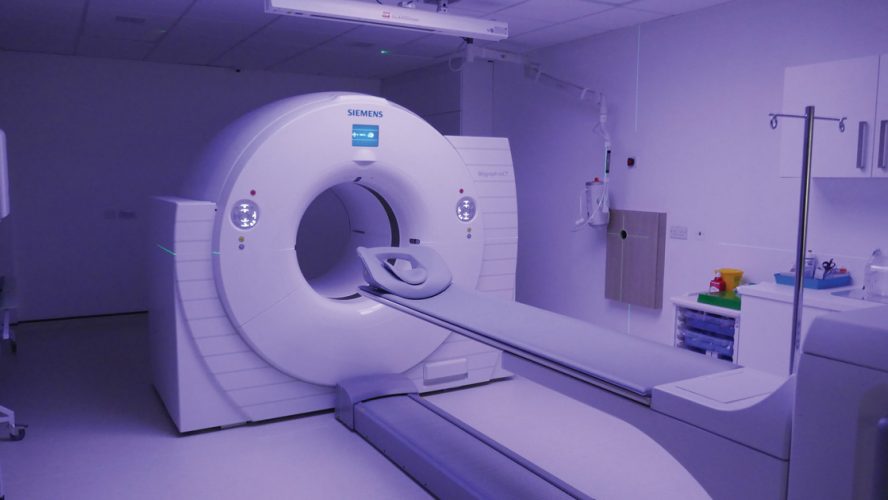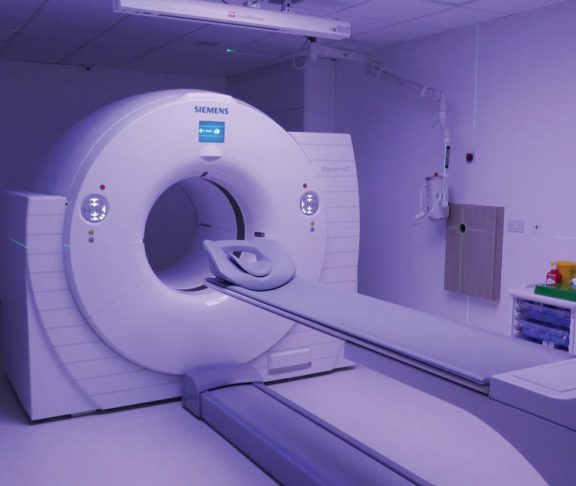A new theranostic imaging technique, offering unprecedented levels of accuracy in diagnosing advanced prostate cancer, will soon be available for treating it.

Dr Yong Du
Consultant in Nuclear Medicine and PET/CT MBBS MSc PhD

Dr Philip Camilleri
Consultant Clinical Oncologist MRCP M.D. FRCR

Mr Alan Doherty
Consultant Urologist MD BS, Bsc, MD, FRCS(Urol), FEBU
The theranostic tool is being hailed as a major step forward in diagnosis and treatment of metastatic castration resistant prostate cancer (mCRPC), which has returned and spread after standard androgen-deprivation treatment has become ineffective.
“These scans can detect a fraction of the amount of cancer than can be detected by other types of scanning, so we can spot the size and location of the cancer earlier,” says clinical oncologist Dr Philip Camilleri. “It is a new weapon in our anti-cancer armoury.”
Prostate cancer is the most commonly diagnosed cancer in males and the second leading cause of cancer mortality among men. While many patients are cured of prostate cancer, a significant proportion progress towards CRPC.
How does this pairing technique work?
The technique involves ‘pairing’ a radio-isotope with prostate specific membrane antigen (PSMA), a protein expressed by prostate tissue, including cancerous tissue, to create a radiotracer for injection into a PET/CT scanning patient.
Pairing PSMA with gallium, as Ga-68 PSMA, gives a highly sensitive tracer that seeks out cancerous tissue, delivering a more accurate picture of the size and location of areas of prostate cancer than previously possible.
Pairing PSMA with lutetium creates Lu-177 PSMA, a tracer which can seek out prostate cancer and then destroy the cancer cells – a demonstration of theranostics and a highly personalised treatment.
Earlier, more accurate prostate cancer diagnoses
Gallium-PSMA PET/CT scans are already used routinely for diagnosing, staging and decision-making (along with Lu-177 PSMA therapy) in CRPC by GenesisCare Australia, and for diagnosis in London, and GenesisCare Windsor, although it is not funded on the NHS.
The technique can detect otherwise-invisible cancers. Mr Alan Doherty, Consultant Urologist and Surgeon, says: “Sometimes a raised level of prostate specific antigen indicates that prostate cancer has returned, even after prostate removal, or the cancer is invisible with most imaging methods. Gallium-PSMA PET/CT scans can detect these cancers.”
He adds: “I would like to recommend the gallium-PSMA PET scan to all my patients with suspected prostate cancer.”
Dr Camilleri says: “Traditional scans are less sensitive – choline PET scans require a much larger mass of cancer before they detect it.”
The new technique also shows advantages over bone scanning. “Ga-68 PSMA scans can detect cancer in the bones – common in prostate cancer – but elsewhere too,” says Dr Camilleri. “It also differentiates between bone damage caused by cancer and that caused by other more common conditions, which bone scanning cannot.”
Faster cancer treatment, fewer side effects
Dr Yong Du is a consultant in nuclear medicine who has used radiopharmaceuticals to treat around 250 patients with mCRPC – more than anyone else in the UK. “This new theranostic tool delivers more accurate assessment and treatment for mCRPC”, he says.
“It enables accurate targeting, reducing delivery of radiation to healthy tissue. It is more effective and less toxic than conventional treatments, although a small percentage of patients might develop treatment-induced xerostomia (dry mouth).”
Dr Du says: “Its minimal toxicity means most patients can receive multiple cycles of treatment without developing significant adverse effects.
“Outpatient assessment, plus treatment, can be achieved within two working days. People can be discharged to their home sooner – particularly valuable for patients travelling from other parts of the UK and abroad.”
Access to the therapy in the UK
At present, PSMA-lutetium treatment is being trialled on patients with mPCRC but GenesisCare will introduce it more widely in the UK soon.
“Currently PSMA-lutetium treatment is only licenced for use in end-stage prostate cancer. Its effectiveness is yet to be fully proven, but it is already showing good results,” says Mr Doherty.
As Dr Camilleri says: “Lutetium kills cancer cells. It is not a complete cure, but it looks like it can keep patients alive, with a better quality of life, for longer.”
Contact
genesiscare.com | [email protected] | 01865 237700 | 69 Alma Road, Windsor, SL4 3HD
February 2019


